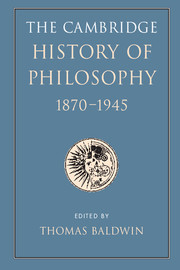Book contents
- Frontmatter
- Contents
- List of contributors
- Introduction
- I 1870–1914
- II 1914–1945
- 8 Logic and philosophy: the analytic programme
- 9 The diversity of philosophy
- 10 Knowledge, language, and the end of metaphysics
- 11 Philosophy and the exact sciences
- 12 Mind and its place in nature
- 13 Philosophy and social science
- 55 The methodology of the social sciences
- 56 The rise of social anthropology
- 57 Western marxism and ideology critique
- 14 Ethics, religion, and the arts
- 15 Law and politics
- Biobibliographical appendix
- Bibliography
- INDEX
- References
57 - Western marxism and ideology critique
from 13 - Philosophy and social science
Published online by Cambridge University Press: 28 March 2008
- Frontmatter
- Contents
- List of contributors
- Introduction
- I 1870–1914
- II 1914–1945
- 8 Logic and philosophy: the analytic programme
- 9 The diversity of philosophy
- 10 Knowledge, language, and the end of metaphysics
- 11 Philosophy and the exact sciences
- 12 Mind and its place in nature
- 13 Philosophy and social science
- 55 The methodology of the social sciences
- 56 The rise of social anthropology
- 57 Western marxism and ideology critique
- 14 Ethics, religion, and the arts
- 15 Law and politics
- Biobibliographical appendix
- Bibliography
- INDEX
- References
Summary
The Russian Revolution of October 1917 and the subsequent formation of the communist International encouraged a philosophical recasting of Marxism. This involved crucially the rejection of the naturalistic interpretation of historical materialism which had prevailed in the Second International. Thus Antonio Gramsci hailed the October Revolution as a ‘revolution against Capital’, that is, against the conception elaborated by Kautsky and Plekhanov of history as an evolutionary process governed by natural laws which operated by ‘irresistible’ necessity. The thought was that the Bolsheviks' attempt to carry through a socialist revolution in an economically backward country and their stress on the indispensable role of a vanguard party in the class struggle required a version of Marxism in which the driving force of change was, not the development of the productive forces, but the constitution of classes as revolutionary subjects.
GEORG LUKÁCS
Various theorists – for example, Karl Korsch and Gramsci himself — participated in this projected philosophical revolution. But its key work was undoubtedly Georg Lukács’s History and Class Consciousness (1923). Lukács brought to Marxism an already formed and sophisticated philosophical sensibility shaped by Neo-Kantianism. A pupil of Simmel and Weber, he took from them chiefly a sense of the extreme fragmentation of modern society. Whatever formal coherence might arise from the use of instrumental rationality to discover the most efficacious means to attain arbitrarily chosen goals, capitalism was unable to integrate its different aspects into a self-equilibrating whole. Individual actors confronted a social world which together they had created, but whose overall workings they were unable either to understand or to control.
- Type
- Chapter
- Information
- The Cambridge History of Philosophy 1870–1945 , pp. 685 - 692Publisher: Cambridge University PressPrint publication year: 2003



